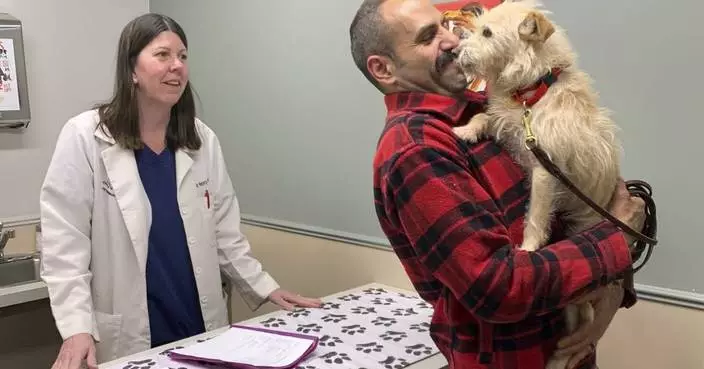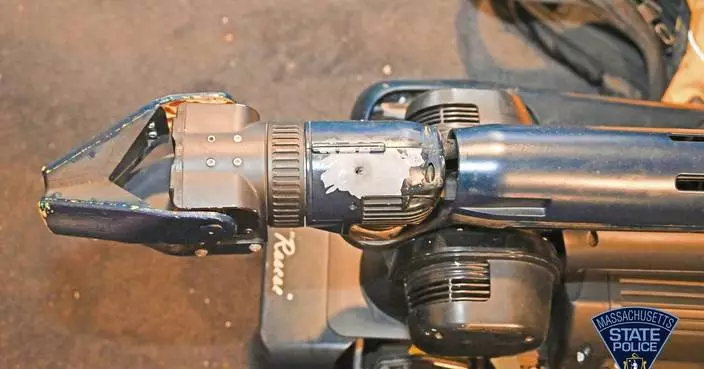Leaping from the van, South Sudan's only two patrol dogs raced toward passengers disembarking a plane in the capital, Juba. After frantically sniffing their luggage, one dog abruptly sat in front of a wary young man and stared at his bag. Removing a piece of ivory from a side pouch, the man breathed a sigh.
It was just a drill, though the dogs hardly need practice runs to sharpen their skills. Ivory and illegal animals regularly flow through this civil war-torn nation that advocacy groups say has become a critical hub for traffickers.
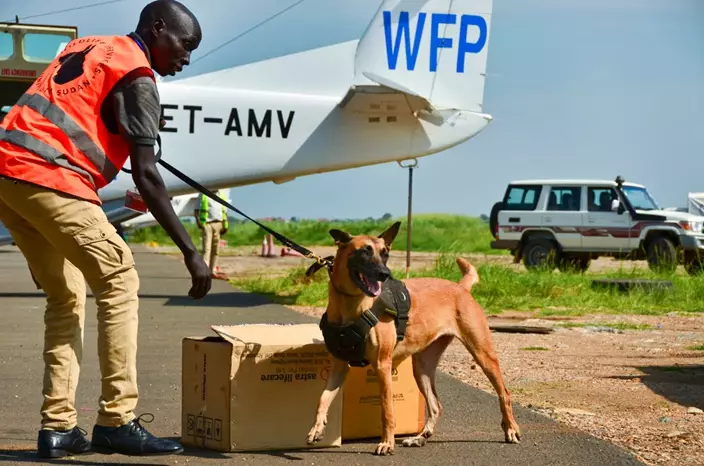
In this photo taken Thursday, July 27, 2017, an anti-trafficking "sniffer" dog inspects passengers' luggage for contraband on the tarmac of the airport in Juba, South Sudan. A two-dog team has been tasked with protecting the entirety of war-torn South Sudan from a flow of ivory and illegal animals, as advocacy groups say the country has become a critical African hub for traffickers. (AP Photo/Mariah Quesada)
"The breakdown of the rule of law and order and the lack of political will to combat the illicit trafficking of wildlife means that South Sudan won't be able to stem the currently out-of-control slaughter and exploitation," said Brian Adeba, associate director of policy at the Enough Project, a Washington-based advocacy group.
A report by the group in July found that South Sudan's conflict has made the East African nation a major way point for ivory and wildlife smuggling.
The consequences of South Sudan's nearly five-year-old civil war have been far-reaching. As the country grapples with starvation, mass displacement and allegations of war crimes, the increased insecurity has led to porous borders and impunity for trafficking crimes.
"People use South Sudan because they believe the laws are soft," said Khamis Adieng, director of external relations for the Ministry of Wildlife Conservation and Tourism.
Most illegal imports come from neighboring Sudan, Uganda and Congo, Adieng said. He attributed the free flow of goods to the lack of government capacity, severe insecurity and the country's vast landscape.
In an attempt to stem the flow, the wildlife ministry and the New York-based Wildlife Conservation Society launched South Sudan's first anti-trafficking canine unit in January 2016.
The two trained Malinois dogs have been tasked with combatting wildlife trafficking in the entire country. With their handlers they work six days a week, patrolling Juba's airport and checkpoints along the capital's roads.
Results are encouraging, the canine team said.
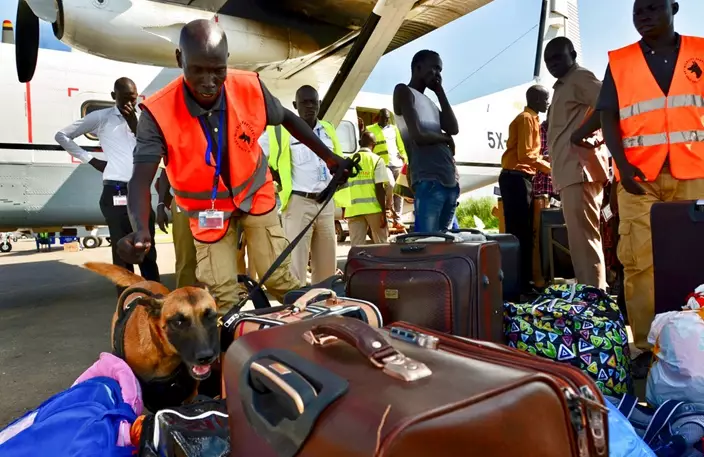
In this photo taken Thursday, July 27, 2017, an anti-trafficking "sniffer" dog inspects passengers' luggage for contraband on the tarmac of the airport in Juba, South Sudan. A two-dog team has been tasked with protecting the entirety of war-torn South Sudan from a flow of ivory and illegal animals, as advocacy groups say the country has become a critical African hub for traffickers. (AP Photo/Mariah Quesada)
"Last year I captured ivory every week and bush meat every day," said Moses, one of the dog handlers. Now it's roughly once and twice a month, respectively. It was not clear whether trafficking was down or people had found other routes. He gave only his first name because of concerns about possible retaliation.
At the airport in February, the dogs discovered 14 pieces of ivory stuffed into two jerry cans full of peanut butter. It was being smuggled by a South Sudanese woman on her way to Egypt, the patrol team said.
And in June, the canine unit confiscated 25 boxes of ivory bound for Malaysia. The ivory originally came from Burundi and passed through Rwanda and Uganda before reaching Juba, the unit said.
Despite the successes, wildlife experts said the problem remains widespread. People are desperate to make a living, said Michael Lopidia, the former deputy director for the Wildlife Conservation Society in South Sudan.
The deteriorating economy also puts wildlife in the country's six national parks at risk. From January to October, 13 elephants were killed, the wildlife ministry said.
Antelope is the animal most widely killed and sold on the local black market, said the canine team, while one of the most sought-after animals for international sale is the pangolin. Demand is high, particularly in China.
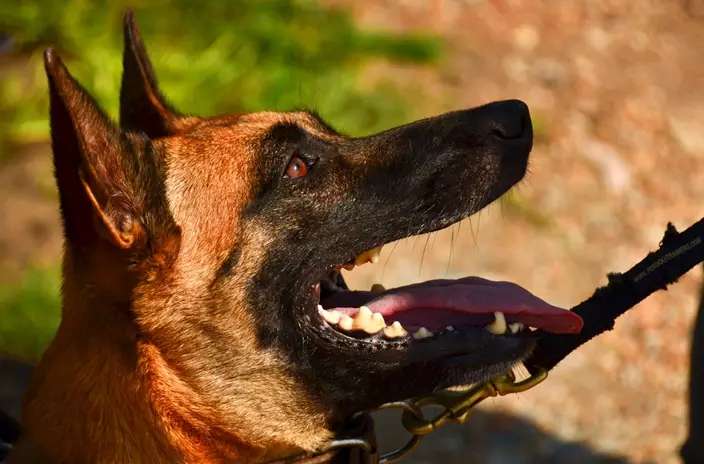
In this photo taken Thursday, July 27, 2017, an anti-trafficking "sniffer" dog that inspects passengers' luggage for contraband is seen on the tarmac of the airport in Juba, South Sudan. A two-dog team has been tasked with protecting the entirety of war-torn South Sudan from a flow of ivory and illegal animals, as advocacy groups say the country has become a critical African hub for traffickers. (AP Photo/Mariah Quesada)
Without South Sudan's "lucrative middle of the illegal wildlife trafficking chain," the wildlife would never reach East Asia, the Enough Project said. The group has asked the government to plug the "gaps that proliferate the illicit activity at entry and exit points across the country."
With two dogs for the entire nation, however, Adieng said the government can only do so much.
"We're struggling," he said. He hopes to bring in more dogs to patrol areas outside the capital, especially along the country's borders.
Ultimately, Adieng said, the canine team can't work properly until the war ends. "We're praying to God that peace will come."
Politicians and dog experts are criticizing South Dakota Gov. Kristi Noem after she wrote in a new book about killing a rambunctious puppy. The story — and the vilification she received on social media — has some wondering whether she's still a viable potential running mate for presumptive Republican presidential candidate Donald Trump.
Experts who work with hunting dogs like Noem’s said she should have trained — not killed — the pup, or found other options if the dog was out of control.
Noem has tried to reframe the story from two decades ago as an example of her willingness to make tough decisions. She wrote on social media that the 14-month-old wirehaired pointer named Cricket had shown aggressive behavior by biting.
“As I explained in the book, it wasn’t easy,” she said on X. “But often the easy way isn’t the right way.”
Still, Democrats and even some conservatives have been critical.
“This story is not landing. It is not a facet of rural life or ranching to shoot dogs,” conservative commentator Tomi Lahrenco posted online.
Several posters described Noem as Cruella de Vil, the villain from the Disney classic “101 Dalmatians.” A meme features a series of dogs offering looks of horror.
“I’m not sure which thing she did was stupider: The fact that she murdered the dog, or the fact that she was stupid enough to publish it in a book,” said Joan Payton, of the German Wirehaired Pointer Club of America. The club itself described the breed as “high-energy,” and said Noem was too impatient and her use of a shock collar for training was botched.
But South Dakota Democratic Senate Minority Leader Reynold Nesiba considered the disclosure more calculated than stupid. He said the story has circulated for years among lawmakers that Noem killed a dog in a “fit of anger” and that there were witnesses. He speculated that it was coming out now because Noem is being vetted as a candidate for vice president.
“She knew that this was a political vulnerability, and she needed to put it out there, before it came up in some other venue," he said. “Why else would she write about it?”
In her soon-to-be-released book, “No Going Back: The Truth on What’s Wrong with Politics and How We Move America Forward,” of which The Guardian obtained a pre-release copy, Noem writes that she took Cricket on a bird hunting trip with older dogs in hopes of calming down the wild puppy. Instead, Cricket chased the pheasants, attacked a family's chickens during a stop on the way home and then “whipped around to bite me," she wrote.
Noem's spokesperson didn't immediately respond to questions from The Associated Press about whether the dog actually bit her or just tried to do so, or whether Noem had to seek medical treatment. The book's publisher declined to provide AP an advance copy of the book.
Afterward, Noem wrote, she led Cricket to a gravel pit and killed her. She said she also shot a goat that the family owned, saying it was mean and liked to chase her kids.
The response to the story was swift: “Post a picture with your dog that doesn’t involve shooting them and throwing them in a gravel pit. I’ll start,” Democratic Minnesota Gov. Tim Walz posted on X. The post included a photo of him feeding ice cream off a spoon to his Labrador mix named Scout.
President Joe Biden’s reelection campaign added a photo of the president strolling on the White House lawn with one of his three German Shepherds. Two of Biden's dogs, Major and Commander, were removed following aggressive behavior, including toward White House and Secret Service personnel. The oldest, Champ, died.
Democrat Hillary Clinton reposted a 2021 comment in which she warned, “Don’t vote for anyone you wouldn’t trust with your dog.” She added Monday, “Still true.”
Conservative political commentator Michael Knowles said on his titular podcast that while Noem could have handled the situation differently, “there is nothing wrong with a human being humanely killing an animal.” He later added: “Fifty years ago, this political story would not have made anyone in most of America bat an eyelash. And the fact that it does today tells you something, not about the changing morality of putting down a farm animal, but about the changing politics of America.”
He later said that the story is “extremely stupid and insignificant” because Noem doesn’t have a chance of being selected as Trump’s running mate.
Payton, who is a delegate to the American Kennel Club and lives in Bakersfield, California, said the situation was a mess from beginning to end.
“That was a puppy that had no experience, obviously no training,” she said. “If you know a minuscule amount about a bird dog, you don’t take a 14 month old out with trained adult dogs and expect them to perform. That’s not how it works.”
The club itself said puppies learn best by hunting one-to-one with their owners, not with other dogs.
When problems arose she should have called the breeder, Payton said, or contacted rescue organizations that find new homes for the breed.
Among those groups is the National German Wirehaired Pointer Rescue, which called on Noem in a Facebook post to take accountability for her “horrific decision” and to educate the public that there are more humane solutions.
“Sporting breeds are bred with bird/hunting instincts but it takes training and effort to have a working field dog,” the group's Board of Directors wrote in the post.
Payton described Cricket as nothing more than “a baby,” saying the breed isn't physically mature until it is 2 years old and not fully trained it's 3- to 5-years old.
“This was a person that I had thought was a pretty good lady up until now," she said. "She was somebody that I would have voted for. But I think she may have shot herself in the foot.”

Politicians and dog experts vilify South Dakota governor after she writes about killing her dog

FILE - South Dakota Republican Gov. Kristi Noem attends an event Jan. 10, 2024, at the state Capitol in Pierre, S.D. The Guardian has obtained a copy of Noem's soon-to-be released book, where she writes about killing an unruly dog, and a smelly goat, too. She writes, according to the Guardian, that the tale was included to show her willingness to do anything "difficult, messy and ugly." (AP Photo/Jack Dura, File)

Politicians and dog experts vilify South Dakota governor after she writes about killing her dog











